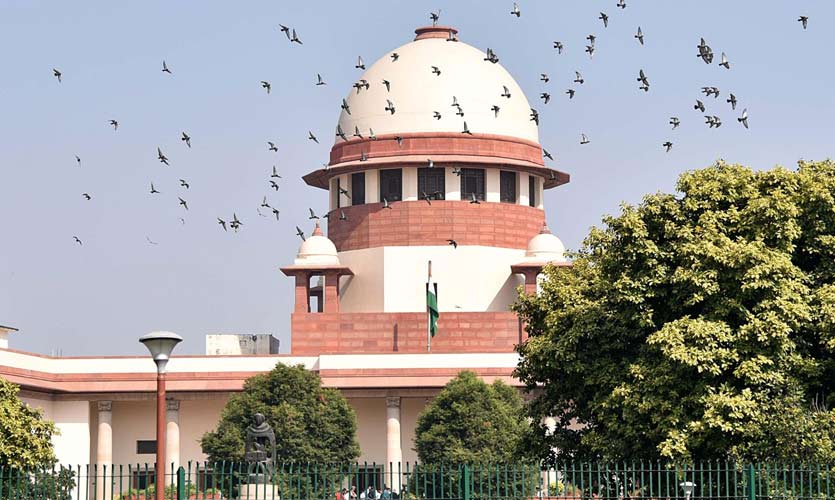Hearing the National Investigation Agency’s (NIA)’s challenge on the bail of two Kerala youths accused of having Maoist connections, the Supreme Court questioned the NIA if recovery of literature, shouting of slogans and connection to a banned organisation can be enough to attract charges under the stringent Unlawful Activities (Prevention) Amendment Act, 2019 (UAPA). “If somebody has a book which is banned by the government, would that implicate them,” asked the apex court.
The Bench comprising Justices Ajay Rastogi and Abhay Sreeniwas Oka was hearing the NIA’s Special Leave Petition (SLP) challenging the Kerala High Court’s order that affirmed a trial court granting bail to law student Allan Shuhaib and journalism student Thwaha Fasal. The accused were charged under the UAPA over alleged links with the banned Communist Party of India (Maoist). Representing the NIA, Additional Solicitor General S.V. Raju argued that the accused students were charged not just for reading Karl Marx, but the “incriminating” material found on them clearly drew the “inference” that they were members of a terror organisation.
The Supreme Court also observed that the students linked with the Maoist organisation are but young boys. “These are boys in their early 20s, they have some material in their possession. Can they be incarcerated only because of some kind of inference you draw? You are saying that they are members of this terrorist organisation? Your charge sheet says that they have given assistance to A3 who is the person who is basically involved. Based on these documents that the charge sheet says have been recovered from them, you are connecting and saying that they have been assisting A3. According to you, if any incriminating material was seized from these persons or their houses, you can infer that they are actively participating in these terrorist organisations?” asked the Bench.
Responding to the Court, ASG Raju said that 15 Maoist notices suspected for distribution, literature urging armed revolution and independence for Jammu and Kashmir, and loads of electronic evidence were found against the duo during the investigation. He added, “Terrorism doesn’t know age. They have got these documents now, they are acting in assistance, it is this how people go on to become terrorists later. We are in a position to control them to some extent because of Acts like UAPA. It is not that they were reading some book by Karl Marx. Look at the quantum of the material.”
The Bench further sought to know why Section 20 of the UAPA was dropped from the charge sheet filed against the accused. Section 20 deals with punishment for being part of a terror organisation. The charge sheet filed by the investigating agency mentions that the two students were associated with and supported a terrorist organisation; in which case, the quantum of punishment is either fine or imprisonment of up to 10 years. If they were found guilty for being part of a terrorist organisation, the punishment is imprisonment for life.
Justice Ajay Rastogi asked ASG Raju, “Are you basically saying that you can just infer that a person is a member of a terror organisation merely from the nature of the material found in his house? Have they been incarcerated for months on the basis of your inference? Where is the incriminating material to show they are members?”
ASG Raju mentioned that the two students have been secretly meeting an active “semi-underground” Maoist leader. “Ordinarily, a student will not have possession of minutes, banners, 15 copies of notices asking persons to attend meetings. A student will not hold meetings with a seasoned member. Prima facie, it is established that he is a member. If that is so, then section 20 will apply irrespective of the charge sheet,” he said.
The ASG further argued that organisations like the CPI (Maoist) are “very sharp, shrewd” and it “is very difficult for investigating agencies to track evidence or build a case”. He said that the Court cannot expect that the investigating agency will provide a paper slip of the accused membership in a Maoist organisation.
Stating that the accused students cannot be dismissed as “innocuous”, ASG Raju argued, “Naxals need the help of these persons to take forward their agenda. The lives of not only citizens but the armed forces are at stake here. They will destroy the country.”
Read more: NIA: Students Of JNU, TISS Recruited For “Terror Activities”
On expressing discontent over the NIA’s delay in bringing charges against the duo, citing the long jail term already served under the UAPA, Raju pleaded that instead of bail the Court could order the trial judge to bring charges within two months and conclude the trial within a year.
Defending Thwaha Fasal, senior advocate Jayant Muthuraj submitted before the Court that during the time of arrest the police only found a copy of the Madhav Gadgil report on the ecology of Western Ghats, and that no other incriminating materials were found. Allan Shuhaib’s lawyer, senior advocate R. Basant also stressed on the fact that the accused have been charged for associating or supporting a banned organisation, which itself is proof that they are not part of it.










